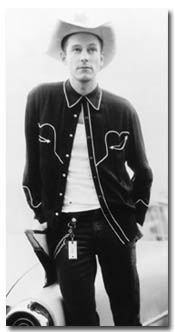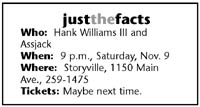|

|

written by Bryant
Liggett
 Country
music. Whether you love it, hate it or just plain ignore it,
it dominates American radio, with more than half of American
radio stations dedicating their formats to it. It’s an
American art form that was created in the early 1900s, gained
popularity through the 1930s and 40s, and then eventually landed
in Music City USA, Nashville, Tenn. We’re all familiar
with the big players from early country – George Jones,
Johnny Cash, Merle Haggard and countless others who left their
mark on American pop culture. Country
music. Whether you love it, hate it or just plain ignore it,
it dominates American radio, with more than half of American
radio stations dedicating their formats to it. It’s an
American art form that was created in the early 1900s, gained
popularity through the 1930s and 40s, and then eventually landed
in Music City USA, Nashville, Tenn. We’re all familiar
with the big players from early country – George Jones,
Johnny Cash, Merle Haggard and countless others who left their
mark on American pop culture.
Then, like most styles of music, things changed. Country went
pop somewhere along the line, moving from simple three-chord
songs about heartbreak and hard times to over-produced bad pop
recorded in million-dollar studios. However, the roots still
exist, and there are a handful of country musicians who revel
in the style of their forefathers, yearn for a sawdust-covered
dance floor in a seedy honky tonk and play a set of heartbreak
classics followed by a set of traditional punk rock.
Punk rock?
Enter Shelton Hank Williams, aka Hank III, the grandson of that
Hank Williams, and the son of Hank “are you ready for
some football?” Williams Jr. Though he is the son of a
“modern” country star, Hank III is more of a mirror
image of his grandfather. His two country albums, released on
Curb Records and aptly titled “Risin’ Outlaw”
and “Lovesick, Broke and Driftin’” are honky-tonk
country at its finest. The albums are proof that country musicians
still exist in and out of Nashville and can create music that
is a reflection of early country – and then throw in something
completely different.
Hank III was raised in North Carolina by his mother and was
weaned on the same music as most kids who grew up in the ’70s,
including Kiss, Ted Nugent and Lynyrd Skynyrd. Eventually that
love for harder music led him into the realm of punk rock. Bands
like The Misfits and Black Flag were influential, leaving a
mark on the young Hank that’s still evident today.
In fact, it was punk rock that he played for years until, in
his early 20s, he decided to make the move to country. He said
he made that decision after being hit with a paternity suit
and a quick realization that playing punk shows for $50 a night
wasn’t going to pay the bills. It was then that he saw
a relationship between the musical worlds of punk and country.
Although two very different styles of music, the bottom line
is they both deal with many of the same issues: angst, alienation,
loneliness, pent-up aggression, rebellion and the hardships
of everyday life.
According to Hank III, the mix of the two styles comes purely
out of a love for playing country and simply rocking out. And
it’s those two loves that enable him to play for diverse
audiences, from country fans in Branson, Mo., to the punk rock
set in New York City.
For some reason, Hank III works outside of the Nashville mainstream.
Perhaps it’s because his music is too rootsy, too raw or too real
for “modern” country fans. The bubble-gum, pop country
created today in no way reflects the early days of honky-tonk,
which perhaps has led Hank III to a form of country-music rebellion,
a rebellion aided by the likes of musician Wayne Hancock, one
of Hank III’s mentors. Hank’s philosophy is that
in Nashville’s heyday most of the musicians were hell-raisers
and younger than 30, much like himself.
it’s because his music is too rootsy, too raw or too real
for “modern” country fans. The bubble-gum, pop country
created today in no way reflects the early days of honky-tonk,
which perhaps has led Hank III to a form of country-music rebellion,
a rebellion aided by the likes of musician Wayne Hancock, one
of Hank III’s mentors. Hank’s philosophy is that
in Nashville’s heyday most of the musicians were hell-raisers
and younger than 30, much like himself.
Hank III has shared his touring schedule with a diverse group,
having opened or toured with the likes of Beck, the Reverend
Horton Heat, George Jones and hard rockers The Melvins. He’s
currently out on tour with his band, Assjack, and they’ll
be coming through town Nov. 9 to play an already sold-out show
at Storyville. The beauty of this tour is that the audience
will be filled with cowboys and punks, for Hank III promises
equal representation of his diverse roots with one set of country
and one set of punk rock.
It’s refreshing to know that there are musicians out there
who don’t tend to label or identify themselves with one
style of music, who can see and revel in the relationships between
different styles of music. It’s also good knowing that
a hard-working man like Hank III can sell out a show in Durango
without any airplay on commercial radio. But best of all, it’s
good to know that country music is cool again.
|

